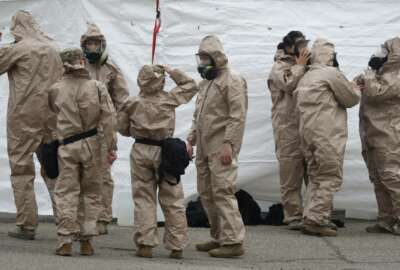The Army is providing a safety net for enlisted soldiers who were scheduled to transition out of the service in the near future.
With a stumbling stock market and skyrocketing unemployment rates, the service is giving roughly 9,000 soldiers an opportunity to stay in the Army for short-term reenlistments of three to 11 months.
“With the recent onset of COVID-19, some of our soldiers have now been faced with the reality that some opportunities are no longer available to them,” Sgt. Maj. Stuart C. Morgan, the Army’s senior career counselor, told Federal News Network. “We have an employment gap. We have multiple reenlistment options that can offer the soldier a new assignment or some type of training and also stabilization options.”
The Army did not previously offer reenlistments of less than a year. Morgan said the purpose of the short-term reenlistments is to give soldiers financial stability during an uncertain time.
Short-term reenlistments will not have the benefits of reenlistment bonuses, which can be worth up to $80,000 a year. Those perks are left to soldiers who take on extra duty for a year or more.
Morgan said available opportunities for soldiers in the civilian world are declining as coronavirus spreads.
“What a soldier today is starting to see is that except for an online school opportunity, the opportunity to go into a resident training course through a college — those options have dwindled significantly in the last few weeks,” Morgan said. “Employers who were looking to hire a soldier, that opportunity may have also disappeared.”
The Army is making other personnel and human resources adjustments in the face of coronavirus as well.
Physical fitness tests and weapon qualifications required to judge the ability to stay in the Army are now altered. Soldiers can use their previous test results to rank up or reenlist.
“Social distancing requirements doesn’t really facilitate one soldier holding another soldier’s ankles for the purpose of the sit-up event,” Morgan said.
Professional military education requirements have been halted for soldiers on the Advanced Leader course and Senior Leader Course.
Other soldiers will complete requirements like Basic Leader, Master Leader and Sergeants Major courses remotely.
“We don’t want soldiers to leave their homes and be in a mass population in an attempt to get trained,” Sgt. Maj. Mark Clark of Army personnel management said. “So again, this is another opportunity to mitigate the risk.”
One time-honored tradition is also moving online. Reenlistment ceremonies are moving online to teleconferencing platforms like Zoom and contracts are being signed through e-signatures.
Promotion boards are now being conducted virtually as well for at least the next six months.
“Commanders can either do a normal monthly promotion board or if their command is decentralized, they’ll do the virtual boards,” Clark said. “Battalions may have Soldiers located in different states or different areas where traveling would be required to attend.”
Copyright
© 2024 Federal News Network. All rights reserved. This website is not intended for users located within the European Economic Area.
